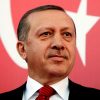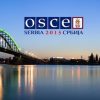The arrest of Turkish journalists, media executives and even the scriptwriter of a popular television series, ostensibly for ‘forming, leading and being a member of an armed terrorist organisation’, brought a swift rebuke from the European Commission and raised the question of whether Turkey’s EU painfully slow accession negotiations should be suspended.
Federica Mogherini, EU Foreign Affairs chief, and Johannes Hahn, Enlargement Commissioner, said the raids and arrests ‘are incompatible with the freedom of media, which is a core principle of democracy’. They said Turkey’s move towards membership depended on ‘full respect for the rule of law and fundamental rights’.
Recep Tayyip Erdoğan responded to the criticism in his characteristically abrasive style, telling the EU to ‘mind its own business and keep its opinions to itself’.
Those arrested, including Ekrem Dumanli, editor-in-chief of Zaman, the country’s widest-circulating newspaper, are associated with the influential Hizmet religious movement, led by the Muslim cleric Fethullah Gülen, who lives in self-imposed exile in the US and runs an extensive network of schools and businesses.
Erdoğan, the former Prime Minister for 11 years and since August the country’s first directly elected President, is locked in a power struggle with Gülen, a former ally, whom he accuses of running a ‘parallel state’.
In December 2013, Erdoğan accused the movement of being behind prosecutors and police who tried to arrest dozens of his supporters on charges of corruption. Erdoğan transferred or fired thousands of police officers and prosecutors and managed to derail the charges.
An Istanbul court rejected this week appeals to pursue the charges and dropped the case, drawing further fire from the EU. In a statement on Tuesday, EU Foreign Ministers said: ‘The response by the government to the alleged cases of corruption in December 2013 cast serious doubts over the independence and impartiality of the judiciary, and demonstrated an increasing intolerance of political opposition, public protest and critical media’.
Only one EU accession chapter (on regional policy) has been opened since 2010, bringing the total number of areas under negotiation since membership talks started in October 2005 to 14 (out of 35). And opening that chapter in November 2013 was delayed four months as a result of pressure from Germany, following the excessively harsh crackdown on anti-government protests over a development project in Gezi Park in the heart of Istanbul. Just one chapter (on R&D) has been opened and provisionally closed.
The Council of Ministers suspended eight chapters in 2006 because of Ankara’s refusal to extend the EU-Turkey Customs Union to Cyprus (an EU member since 2004). Cyprus, the northern third of which has been occupied by Turkey since its invasion in 1974, has unilaterally suspended another six chapters and France (during the presidency of Nicolas Sarkozy) has blocked four unilaterally. Talks to reunify Cyprus broke down yet again last October when Ankara said it would search for oil and gas in waters where Cyprus has already licensed drilling.
Erdoğan’s latest outburst comes at a time when Euroscepticism is on the rise, and with it opposition to Turkey’s EU membership. Last May’s European elections produced stronger results for anti-EU parties in France, Denmark, Hungary and, in particular, the UK. Furthermore, David Cameron, the British Prime Minister and the most active supporter of Turkey’s EU membership, has raised the prospect of the UK leaving the EU if it does not get its way on issues such as immigration. Furthermore, the EU is suffering from ‘enlargement fatigue’: Jean-Claude Juncker, the new European Commission President, sees no country joining the EU before 2019.
Andrew Duff, a former MEP and president of the Union of European Federalists, believes Turkey’s negotiations are ‘at best useless and at worst fraudulent: they should now be suspended’. Duff, a self-confessed Turkophile, now says in public what many believe in private.
Erdoğan began well when his centrist Islamic Justice and Development Party (AKP) was swept to power in 2002, producing the equivalent of a tsunami for the Kemalist political establishment (the secular Mustafa Kemal Atatürk founded the modern Turkish state in 1923 on the ruins of the Ottoman Empire). The AKP revived Turkey’s moribund EU accession process (which dates back to 1963 when it became an associate member), introduced much-needed reforms, including placing the military, the arbiter of political life, under civilian control, broke nationalist taboos by acknowledging, to some degree, the 1915 Armenian massacres, pursued a solution to the division of Cyprus, which was unsuccessful, and reached out to Kurds by recognising cultural rights and approving a legal framework for peace talks with the separatist Kurdistan Workers’ Party (PKK). Per capita income has doubled in the last 12 years, reflecting economic reforms that have unleashed a dynamic private sector.
But the longer he has been in power –winning just under 50% of the vote in the 2011 general election– the more authoritarian he has become. In Duff’s words, ‘Erdogan knows how to be elected democratically, but not to govern so’. Opponents are treated with disdain, if not persecuted. His majoritarian understanding of democracy à la Vladimir Putin was epitomised when he told the Gezi protestors: ‘If you don’t agree with my decisions, win an election’. When he was mayor of Istanbul (1994-98) he stated that democracy was like a bus: ‘You ride it until you arrive at your destination, then you step off’. Erdoğan would appear to be getting off.
The disregard for the rule of law is hard to square with the government’s so-called ‘new’ EU strategy as set out in the policy document published by the Ministry of EU Affairs last September, shortly after Erdogan became President, which aims to eliminate the obstacles to Turkey’s full membership. The political reform process, according to the document, ‘will be based on advancing the reforms of the last 12 years in rule of law, democratisation, human rights, civilisation, freedom and security’.
The repeated warnings to Ankara by Brussels about Turkey’s slippage in the EU accession process are falling on deaf ears. For how much longer can the EU allow this to happen without losing credibility? Its patience is wearing thin. Neither side, however, wants to throw in the towel. For geostrategic reasons, Brussels wants to keep Turkey on board –it has been a NATO member since 1952– and the business class wants EU membership.
One way to get the EU negotiations back on track and for Brussels to regain the influence it has lost in Turkey’s accession process –as suggested in a recent report for Carnegie Europe by Marc Pierini, a former EU ambassador to Turkey, and Sinan Ülgen– would be to exempt chapters 23 and 24 from the current blockade of negotiations. This would allow for an in-depth discussion of judiciary and rule-of-law issues, of central importance for Turkey and the ones that raise the most concerns among EU member states. Erdoğan would be then put on the spot.



